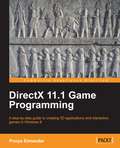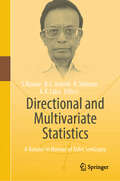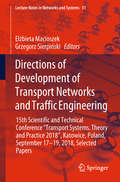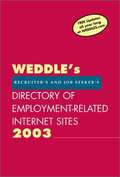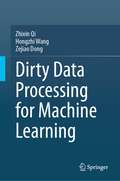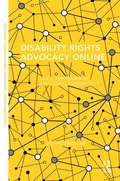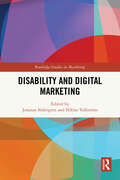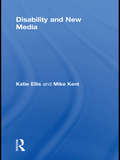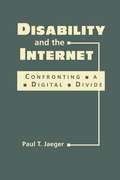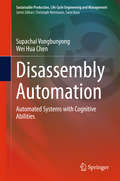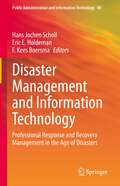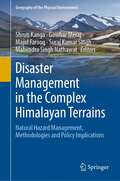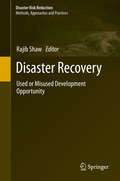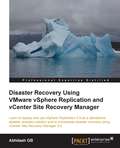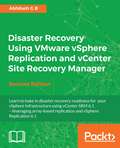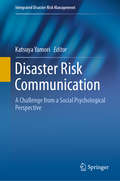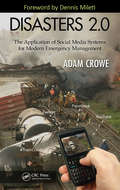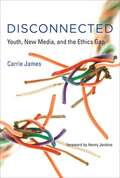- Table View
- List View
Direct3D Rendering Cookbook
by Justin StenningThis is a practical cookbook that dives into the various methods of programming graphics with a focus on games. It is a perfect package of all the innovative and up-to-date 3D rendering techniques supported by numerous illustrations, strong sample code, and concise explanations. Direct3D Rendering Cookbook is for C# .NET developers who want to learn the advanced rendering techniques made possible with DirectX 11.2. It is expected that the reader has at least a cursory knowledge of graphics programming, and although some knowledge of Direct3D 10+ is helpful, it is not necessary. An understanding of vector and matrix algebra is required.
DirectX 11.1 Game Programming
by Pooya EimandarWritten in step-by-step tutorial format, we will explore the creation of 3D applications and games through the development of a Windows 8 metro style game.DirectX 11.1 Game Programming Written for developers with knowledge of C++ essentails and 3D mathematics who would want to create metro style game on the Windows 8 platform.DirectX 11.1 Game Programming explores Direct3D 11.1 and Microsoft C++ component extensions along with introducing C++ accelerated massive parallelism.
Directing Game Animation: Building a Vision and a Team with Intent
by Mike JungbluthThe best character animation has a strong creative intent, driving a compelling performance. With the addition of interactivity, game animation adds complexity to the craft of how best to balance art, design and technology to realize a character’s performance. As a director, you are responsible for not only defining a vision for how those should balance but also being a leader, mentor and advocate for your team. But in a field of rapid iteration of ideas and techniques, that strong creative intent can be easily lost or sacrificed if not properly fostered and defined.Directing Game Animation: Building a Vision and a Team with Intent breaks down the process of creating an intentional animation vision that can be both unique and flexible. From defining the high-level experience to breaking down tech needs, projecting a team size and empowering everyone to work together, this book will help you to wrap your mind around a project’s animation needs.Animation, like every part of a game, cannot succeed—let alone function—in a vacuum. This book looks to foster a discussion around the process, needs and benefits of an empowered animation team and its vision as a universal benefit for the entire industry.This book is a guide to answer some of the most common questions people encounter when engaging with the overlap between creative and project leadership. What is your role? Learn how to establish expectations and needs specific to the project and team. How do you establish a vision? Learn how to better define and communicate creative topics such as a cohesive character performance and animation style. How do you build a team? Learn how to establish early on the team structure, skills and workflows needed to deliver on the needs of the project. How do you balance creative and production needs? Learn how to define quality, reviews and approvals in a way that empowers creativity and decision-making.
Directing for Animation: Everything You Didn't Learn in Art School
by Tony BancroftThere’s no class in art school that can teach you this. Believe it or not, there’s a lot more to directing a great animated film than beautiful illustrations and cool characters. You need to bring out your inner creative visionary and take your savvy leadership skills to the front lines - being great with a pencil, brush, or stylus is not enough. Tony Bancroft released his inner creative visionary when creating Mulan. In Directing for Animation he shows you exactly how. Pull the right strings to bring your characters to life and center your story by developing the visual cues that lend to your audiences understanding of the plot, place, and purpose. Tony walks you through the process, bringing you behind the scenes of real, well-known projects - with a little help from some famous friends. Learn from the directors of Aladdin, The Little Mermaid, Ice Age, Chicken Run, and Kung Fu Panda, and see how they developed stories and created characters that have endured for generations. Get the inside scoop behind these major features…pitfalls and all.
Directing the Story: Professional Storytelling and Storyboarding Techniques for Live Action and Animation
by Francis GlebasFrancis Glebas, a top Disney storyboard artist, shows how to reach the ultimate goal of animation and moviemaking by showing how to provide audiences with an emotionally satisfying experience. Directing the Story offers a structural approach to clearly and dramatically presenting visual stories. With Francis' help you'll discover the professional storytelling techniques which have swept away generations of movie goers and kept them coming back for more. You'll also learn to spot potential problems before they cost you time or money and offers creative solutions to solve them.Best of all, it practices what it preaches, using a graphic novel format to demonstrate the professional visual storytelling techniques you need to know.
Directional and Multivariate Statistics: A Volume in Honour of Ashis SenGupta
by Barry C. Arnold Arnab Kumar Laha Somesh Kumar Kunio ShimizuThis book contains select chapters on a range of topics in directional statistics, multivariate statistical inference, financial statistics, statistical machine learning and reliability inference. At the 43rd Annual Convention of the Indian Society for Probability and Statistics (ISPS) held in Prayagraj (formerly Allahabad), Uttar Pradesh, India, from 6–8 February 2024, attribute was paid to Prof. Ashis SenGupta on the occasion of his 70th birthday. He has pioneered research on directional statistics in the modern era in India and enhanced it worldwide and contributed significantly to the advancement of the following topics: Highly flexible distributions on manifolds Statistical machine learning in data science Big data on manifolds Optimal multiparameter, multivariate statistical inference Reliability inference and stress-dependent-strength models Directional statistics for highly volatile financial models Cylindrical, spherical and toroidal regression analysis Innovative applications of emerging real-life directional data
Directions of Development of Transport Networks and Traffic Engineering: 15th Scientific And Technical Conference Transport Systems. Theory And Practice 2018 , Katowice, Poland, September 17-19, 2018, Selected Papers (Lecture Notes in Networks and Systems #51)
by Elżbieta Macioszek Grzegorz SierpińskiThis book offers a collection of valuable guidelines for making decisions concerning the future development of transport networks and traffic engineering. The decision-making support systems described here will certainly attract the interest of those who face the challenge of finding solutions to problems concerning modern transport systems on a daily basis. Consequently, the book is chiefly intended for local authorities involved in planning and preparing development strategies for specific transport-related areas (in both urban and regional contexts), as well as for representatives of business and industry who are directly engaged in the implementation of traffic engineering solutions. The guidelines provided in the respective chapters help to address the given problem soundly, and to simplify the selection of an appropriate strategy. The topics covered include increasing the competitiveness of public transport, the status quo of electric vehicle infrastructures worldwide, methods for calming urban traffic as an element of sustainable transport development, speed traffic zones and electric buses, car-sharing systems in Poland, a method for deconstructing the regional travel demand model, monitoring urban traffic using floating car data, problems of deliveries in urban agglomeration distribution systems, estimating the number of threatened people in case of fire in road tunnels, and road pavement evaluation using advanced tools. Since the book also considers new approaches to theoretical models (including traffic flow surveys and measurements, transport behaviors, human factors in traffic engineering, and road condition modeling), it will also appeal to researchers and scientists studying these problems. The book gathers selected papers presented at the 15th Scientific and Technical Conference “Transport Systems. Theory and Practice”, organized by the Department of Transport Systems and Traffic Engineering, Silesian University of Technology in Katowice, Poland on September 17–19, 2018.
Directory of Employment-Related Internet Sites
by Peter D. WeddleThere are over 40,000 employment-related sites currently operating on the Internet. These job boards, resume databanks and career portals can give you a powerful advantage in the search for talent and in finding a new or better job. How can you take best advantage of these resources? Whether you're a job seeker or career activist, a recruiter or HR professional, the key to success is smart shopping-picking the right site for your particular situation and location. But to shop smart online, you need to know your options. And that's where WEDDLE's 2003 Directory of Employment-Related Internet Sites comes in! It is the most comprehensive and up-to-date listing of these sites in print, and it's been completely updated for 2003. In WEDDLE's Directory, you'll find over 6,000 sites organized in three categories: * Career field (e.g., sales and marketing, finance and accounting, human resources, engineering). * Industry (e.g., healthcare, banking, construction, insurance). * Location (including every state in the Union and more than 25 countries). All you have to do is find the category of interest to you, and "let your mouse do the clicking!" Each site is listed by name and its address (also called its Universal Resource Locator or URL) on the Internet. That way, you can find just the right sites for you, quickly and easily.
Dirt Bikes, Drones, and Other Ways to Fly
by Conrad WesselhoeftSeventeen year-old dirt-bike-riding daredevil Arlo Santiago catches the eye of the U.S. military with his first-place ranking on a video game featuring drone warfare, and must reconcile the work they want him to do with the emotional scars he has suffered following a violent death in his family. Adios, Nirvana author Conrad Wesselhoeft, takes readers from the skies over war-torn Pakistan to the dusty arroyos of New Mexico's outback in this young adult novel about daring to live in the wake of unbearable loss.
Dirty Data Processing for Machine Learning
by Hongzhi Wang Zhixin Qi Zejiao DongIn both the database and machine learning communities, data quality has become a serious issue which cannot be ignored. In this context, we refer to data with quality problems as “dirty data.” Clearly, for a given data mining or machine learning task, dirty data in both training and test datasets can affect the accuracy of results. Accordingly, this book analyzes the impacts of dirty data and explores effective methods for dirty data processing. Although existing data cleaning methods improve data quality dramatically, the cleaning costs are still high. If we knew how dirty data affected the accuracy of machine learning models, we could clean data selectively according to the accuracy requirements instead of cleaning all dirty data, which entails substantial costs. However, no book to date has studied the impacts of dirty data on machine learning models in terms of data quality. Filling precisely this gap, the book is intended for a broad audience ranging from researchers in the database and machine learning communities to industry practitioners. Readers will find valuable takeaway suggestions on: model selection and data cleaning; incomplete data classification with view-based decision trees; density-based clustering for incomplete data; the feature selection method, which reduces the time costs and guarantees the accuracy of machine learning models; and cost-sensitive decision tree induction approaches under different scenarios. Further, the book opens many promising avenues for the further study of dirty data processing, such as data cleaning on demand, constructing a model to predict dirty-data impacts, and integrating data quality issues into other machine learning models. Readers will be introduced to state-of-the-art dirty data processing techniques, and the latest research advances, while also finding new inspirations in this field.
Disability Rights Advocacy Online: Voice, Empowerment and Global Connectivity (Routledge Studies in Global Information, Politics and Society)
by Filippo TrevisanDisability rights advocates in the United Kingdom and the United States recently embraced new media technologies in unexpected and innovative ways. This book sheds light on this process of renewal and asks whether the digitalisation of disability rights advocacy can help re-configure political participation into a more inclusive experience for disabled Internet users, enhancing their stakes in democratic citizenship.
Disability and Digital Marketing (Routledge Studies in Marketing)
by Jonatan Södergren Niklas VallströmThis book explores how digital marketing can drive disability inclusion in consumer culture by addressing accessibility, representation, and research methodologies. It offers practical and theoretical insights for academics, practitioners, and policymakers interested in marketing, communication, sociology, and public policy.The first part, Digital Marketplace Accessibility, examines strategies for reducing the digital divide, including inclusive hiring practices and accessible platform development. The second part, Digital Representation, focuses on how people with disabilities are portrayed in digital media. It analyses topics such as aesthetics, influencer marketing, mental health advocacy, and neurodiversity. The third part, Digital Methodologies, highlights research approaches like netnography and offers reflections on methodological challenges when researching consumers with disabilities. Contributors discuss practices for conducting ethical and inclusive research involving people with disabilities, providing a roadmap for scholars. The final part, Poetic Epilogue, takes a poetic turn, offering an ecopoetic reflection on lived experiences of Alzheimer’s disease.This book encourages readers to reconsider disability as a complex and intersectional category. It inspires marketers, researchers, and advocates to adopt more inclusive and socially conscious marketing practices, ultimately contributing to a more equitable digital consumer culture.
Disability and New Media (Routledge Studies in New Media and Cyberculture)
by Katie Ellis Mike KentDisability and New Media examines how digital design is triggering disability when it could be a solution. Video and animation now play a prominent role in the World Wide Web and new types of protocols have been developed to accommodate this increasing complexity. However, as this has happened, the potential for individual users to control how the content is displayed has been diminished. Accessibility choices are often portrayed as merely technical decisions but they are highly political and betray a disturbing trend of ableist assumption that serve to exclude people with disability. It has been argued that the Internet will not be fully accessible until disability is considered a cultural identity in the same way that class, gender and sexuality are. Kent and Ellis build on this notion using more recent Web 2.0 phenomena, social networking sites, virtual worlds and file sharing. Many of the studies on disability and the web have focused on the early web, prior to the development of social networking applications such as Facebook, YouTube and Second Life. This book discusses an array of such applications that have grown within and alongside Web 2.0, and analyzes how they both prevent and embrace the inclusion of people with disability.
Disability and the Internet
by Paul T. JaegerFrom websites to mobile devices, cyberspace has revolutionized the lived experience of disability, frequently for better, but sometimes for worse. Paul Jaeger offers a sweeping examination of the complex and often contradictory relationships between people with disabilities and the Internet. Tracing the historical and legal evolution of the digital disability divide in the realms of education, work, social life, and culture, and also exploring avenues of policy reform and technology development, Jaeger connects individual experiences with the larger story of technology¿s promise and limitations for providing equal access online.
Disassembly Automation
by Supachai Vongbunyong Wei Hua ChenThis book presents a number of aspects to be considered in the development of disassembly automation, including the mechanical system, vision system and intelligent planner. The implementation of cognitive robotics increases the flexibility and degree of autonomy of the disassembly system. Disassembly, as a step in the treatment of end-of-life products, can allow the recovery of embodied value left within disposed products, as well as the appropriate separation of potentially-hazardous components. In the end-of-life treatment industry, disassembly has largely been limited to manual labor, which is expensive in developed countries. Automation is one possible solution for economic feasibility. The target audience primarily comprises researchers and experts in the field, but the book may also be beneficial for graduate students.
Disaster Management and Information Technology: Professional Response and Recovery Management in the Age of Disasters (Public Administration and Information Technology #40)
by Hans Jochen Scholl Eric E. Holdeman F. Kees BoersmaThis edited book entertains a multitude of perspectives on crisis information management systems (CIMS)-based disaster response and recovery management. The use of information technology in disaster management has become the central means for collecting, vetting, and distributing information. It also serves as the backbone for coordination and collaboration between response and recovery units as well as resource management tool. This edited volume aims at covering the whole range of application and uses of CIMS in disaster response and recovery. It showcases coordination and collaboration mechanisms between government agencies, the involvement of non-governmental entities, lessons learned as well as lessons not learned, approaches to disaster resiliency in society, community engagement in disaster/catastrophe responses and recovery, and, particularly, the role of CIMS in response and recovery. Serving as a platform for showcasing recent academic discoveries as well as a knowledge source for practitioners, this volume will be of interest to researchers and practitioners interested in disaster response, public administration, emergency management, and information systems.
Disaster Management in the Complex Himalayan Terrains: Natural Hazard Management, Methodologies and Policy Implications (Geography of the Physical Environment)
by Mahendra Singh Nathawat Shruti Kanga Suraj Kumar Singh Gowhar Meraj Majid FarooqSouth Asia, harboring the complex Himalayan terrains, has over one-fifth of the world’s population and is recognized as the most hazard-prone region of the world. The exponential increase in population with the consequent pressure on natural resources and continued high rates of poverty and food insecurity also makes this region the most vulnerable region to hazards in the world as far as the impacts of climate change are concerned. Over the last century, the climatic trends in South-Asia have been observed to be characterized by increasing air temperatures and an increasing trend in the intensity and frequency of extreme events. IPCC (2014) has reported that the Himalayan highlands shall face significant warming over the next century. The increasing frequency of natural hazards due to the impacts of climate change in the Himalayas calls for efficient management and policymaking in these regions, which can only be implemented by the local governments through an established science-based robust action plan. This edited volume focuses on the management of natural hazards using innovative techniques of spatial information sciences and satellite remote sensing. It contains chapters from eminent researchers and experts in the field of hazard management, remote sensing, and GIS. The primary focus of this book is to replenish the gap in the available literature on the subject by bringing the concepts, theories, and practical experiences of the specialists and professionals in this field together in one volume to help students, researchers, and policymakers to address issues concerning management and policy implications of natural hazards in the complex Himalayan region.
Disaster Recovery
by Rajib ShawThis book explains key lessons learned from diverse disaster situations and analyzes them within the framework of governance, education, and technology, providing a framework for disaster recovery as a development opportunity. In post-disaster situations, different types of resources are put into the affected region, varying according to technical, financial, intellectual, and community resources. If properly implemented, disaster recovery can change the context of risk-reduction approaches; if not, it can create additional hazards. In some countries, the post-disaster recovery process has even changed the socio-economic and political context of the affected region and country. The book has 21 chapters and is divided into four parts: governance and institutional issues (five chapters), education and learning issues (four chapters), technology and innovation issues (five chapters), and cross-cutting issues (five chapters). The final chapter provides an analysis of the key topics. The primary target groups for this book are students and researchers in the fields of environment, disaster risk reduction, and climate change studies. The book provides them with a good idea of the current research trends in the field and furnishes basic knowledge about these vital topics. Another target group comprises practitioners and policy makers, who will be able to apply the knowledge collected here to policy and decision making.
Disaster Recovery Using VMware vSphere Replication and vCenter Site Recovery Manager
by Abhilash GbIn Detail VMware vCenter Site Recovery Manager automates disaster recovery in a manner that no other solution does. It is programmed to leverage array-based replication and VMware's proprietary vSphere Replication engine. This book will familiarize you with the concepts of disaster recovery using vCenter Site Recovery Manager and vSphere Replication. You will learn how to deploy and confi gure vSphere Replication in the standalone mode to replicate virtual machines. You will also learn how to use vCenter Site Recovery Manager to leverage array-based replication or vSphere Replication, form Recovery Plans and orchestrate them to perform a test, Planned Migration, Failover, or Failback. Approach This is a step-by-step guide that will help you understand disaster recovery using VMware vSphere Replication 5.5 and VMware vCenter Site Recovery Manager (SRM) 5.5. The topics and configuration procedures are accompanied with relevant screenshots, flow-charts, and logical diagrams that makes grasping the concepts easier. Who this book is for This book is a guide for anyone who is keen on using vSphere Replication or vCenter Site Recovery Manager as a disaster recovery solution. This is an excellent handbook for solution architects, administrators, on-field engineers, and support professionals. Although the book assumes that the reader has some basic knowledge of data center virtualization using VMware vSphere, it can still be a very good reference for anyone who is new to virtualization.
Disaster Recovery Using VMware vSphere Replication and vCenter Site Recovery Manager - Second Edition
by Abhilash G BLearn to bake in disaster recovery readiness for your vSphere Infrastructure using vCenter SRM 6.1, leveraging array-based replication and vSphere Replication 6.1 About This Book * This is the first book on the market that provides an extensive disaster recovery solution using the latest vSphere Replication and vCenter Site Recovery Manager * Master the skills of protecting your virtual machines by replicating and recovering them in seconds * This practical, step-by-step guide will help you protect all your applications with Site Recovery Manager and Replication Who This Book Is For If you are a system administrator who is looking for a disaster recovery solution using the latest VMware vSphere Replication and vCenter Site Recovery Manager, this book is perfect for you. You should have a basic knowledge of virtual machines and data center operations. What You Will Learn * Familiarize yourself with disaster recovery concepts and the architecture of vCenter Site Recovery Manager and vSphere Replication. * Deploy and Configure vCenter Site Recovery Manager to leverage array-based replication and vSphere Replication. * Use vSphere Replication as a standalone disaster recovery solution. * Enabling protection of Virtual Machines by creating Protection Groups. * Enable orchestration of the recovery of protected virtual machines by creating Recovery Plans. * Migrate virtual machine workload from one site to another using Recovery Plans * Testing and Performing a failover or failback of Virtual Machines using Recovery Plans * Enable vRealize Orchestrator Plugins for SRM and vSphere Replication. In Detail VMware vCenter Site Recovery manage is an orchestration tool used to automate disaster recovery in a manner that no other solution does. It is programmed to leverage array-based replication and VMware's proprietary vSphere Replication engine. The book begins by talking about the architecture of SRM and guides you through the procedures involved in installing and configuring SRM to leverage array-based replication. You will then learn how to protect your virtual machines by creating Protection Groups and validate their recoverability by testing recovery plans and even performing failover and failback. Moving on, you will learn how to install and configure vSphere Replication as a standalone disaster recovery solution. It also guides you through the procedures involved in configuring SRM to leverage vSphere replication. Finally, you will learn how to deploy and configure vRealize Orchestrator and its plugin for SRM and vSphere Replication. Style and approach This is a practical, step-by-step guide on implementing a disaster recovery solution for your organization using VMware vSphere Replication and vCenter Site Recovery Manager.
Disaster Risk Communication: A Challenge from a Social Psychological Perspective (Integrated Disaster Risk Management)
by Katsuya YamoriThis book provides a unique blend of integrated disaster risk communication research conducted by authors with diverse backgrounds, including social psychology, sociology, civil engineering, informatics, and meteorology. It reports on the latest advances in collaborative and participatory action research on community-based disaster management from the frontline in Japan, Nepal, China and the USA. In addition, it employs and integrate a broad range of methodologies, including mathematical analyses, computer simulations, questionnaire surveys, gaming approaches, and participatory observation. Each chapter deals with disaster risk communication initiatives to address various hazards, such as earthquakes, tsunamis, floods and landslides, which are uniquely integrated from a social psychological perspective.
Disasters 2.0: The Application of Social Media Systems for Modern Emergency Management
by Adam CroweEmerging social media and so-called Web 2.0 technologies will continue to have a great impact on the practice and application of the emergency management function in every public safety sector. Disasters 2.0: The Application of Social Media Systems for Modern Emergency Management prepares emergency managers and first responders to successfully appl
Disconnect: Facebook's Affective Bonds
by Tero KarppiAn urgent examination of the threat posed to social media by user disconnection, and the measures websites will take to prevent it No matter how pervasive and powerful social media websites become, users always have the option of disconnecting—right? Not exactly, as Tero Karppi reveals in this disquieting book. Pointing out that platforms like Facebook see disconnection as an existential threat—and have undertaken wide-ranging efforts to eliminate it—Karppi argues that users&’ ability to control their digital lives is gradually dissipating. Taking a nonhumancentric approach, Karppi explores how modern social media platforms produce and position users within a system of coded relations and mechanisms of power. For Facebook, disconnection is an intense affective force. It is a problem of how to keep users engaged with the platform, but also one of keeping value, attention, and desires within the system. Karppi uses Facebook&’s financial documents as a map to navigate how the platform sees its users. Facebook&’s plans to connect the entire globe through satellites and drones illustrates the material webs woven to keep us connected. Karppi analyzes how Facebook&’s interface limits the opportunity to opt-out—even continuing to engage users after their physical death. Showing how users have fought to take back their digital lives, Karppi chronicles responses like Web2.0 Suicide Machine, an art project dedicated to committing digital suicide. For Karppi, understanding social media connectivity comes from unbinding the bonds that stop people from leaving these platforms. Disconnection brings us to the limit of user policies, algorithmic control, and platform politics. Ultimately, Karppi&’s focus on the difficulty of disconnection, rather than the ease of connection, reveals how social media has come to dominate human relations.
Disconnected
by Carrie JamesFresh from a party, a teen posts a photo on Facebook of a friend drinking a beer. A college student repurposes an article from Wikipedia for a paper. A group of players in a multiplayer online game routinely cheat new players by selling them worthless virtual accessories for high prices. In Disconnected, Carrie James examines how young people and the adults in their lives think about these sorts of online dilemmas, describing ethical blind spots and disconnects. Drawing on extensive interviews with young people between the ages of 10 and 25, James describes the nature of their thinking about privacy, property, and participation online. She identifies three ways that young people approach online activities. A teen might practice self-focused thinking, concerned mostly about consequences for herself; moral thinking, concerned about the consequences for people he knows; or ethical thinking, concerned about unknown individuals and larger communities. James finds, among other things, that youth are often blind to moral or ethical concerns about privacy; that attitudes toward property range from "what's theirs is theirs" to "free for all"; that hostile speech can be met with a belief that online content is "just a joke"; and that adults who are consulted about such dilemmas often emphasize personal safety issues over online ethics and citizenship. Considering ways to address the digital ethics gap, James offers a vision of conscientious connectivity, which involves ethical thinking skills but, perhaps more important, is marked by sensitivity to the dilemmas posed by online life, a motivation to wrestle with them, and a sense of moral agency that supports socially positive online actions.
Disconnected: How to Stay Human in an Online World
by Emma GannonPRE-ORDER NOW: The new book by Sunday Times bestselling author, Emma Gannon I love Emma Gannon's wise and refreshing perspective on work, and more broadly on the challenges of building a meaningful life in an era of distraction, overwhelm and uncertainty. - Oliver Burkeman, New York Times Bestselling author of Four Thousand Weeks__________Millennials might have grown up online but now they want to log off. And it's not just millennials. A year of lockdowns, Zoom meetings and reduced physical contact has made us more dependent on the internet than ever before - but has it lost its humanity? Our focus on community and real connection has been sent off-course and we're becoming more aware of how the algorithm manipulates us and how our data has made us a product to be sold. So, where do we go from here and how can we get back on track? (Dis)connected examines these topics and offers tangible tips and advice for those of us who might feel a little lost right now and want to find themselves again.__________Emma Gannon is a cordial and provocative spirit. Read her, listen to her, explore her world and the world at large through her eyes. Hers is a journey well worth taking. - Julia Cameron, New York Times Bestselling author of The Artist's Way

